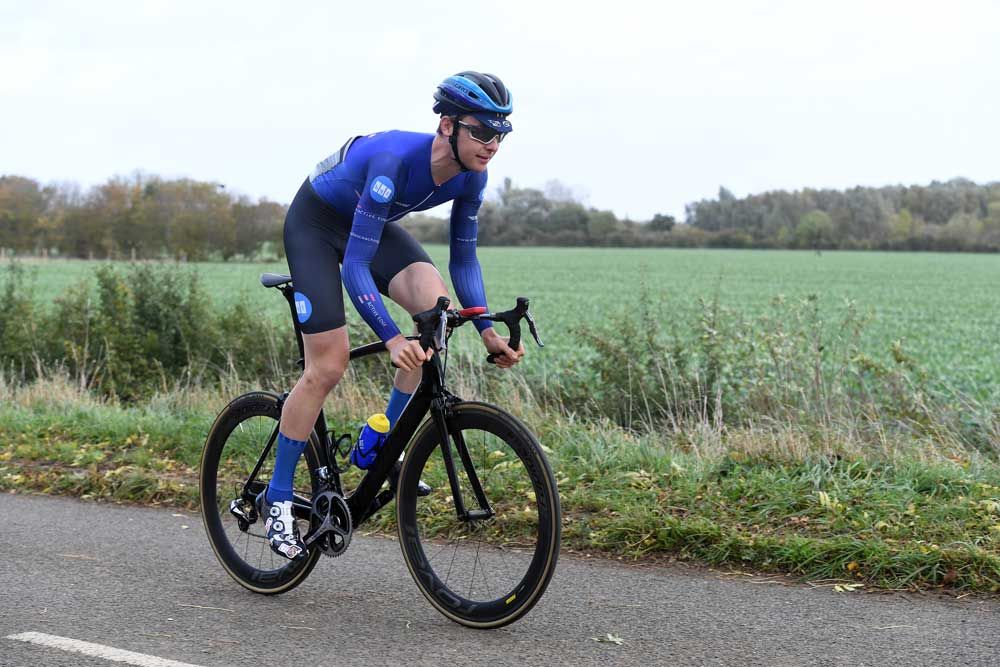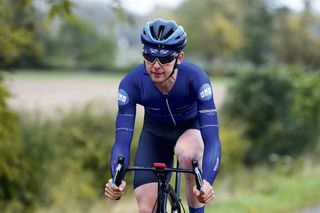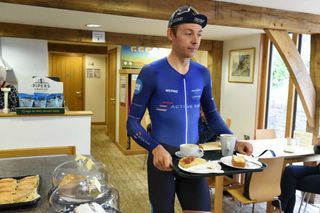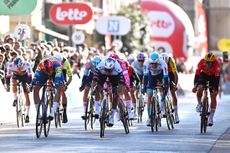Too healthy to ride? How clean living could slow you down
While a healthy diet is central to optimal cycling performance, for some riders the quest to eat only the ‘right’ foods morphs into orthorexia, an unhealthy fixation with purity - Words by Anita Bean


The pursuit of wellness is rightly important to most cyclists. For some, though, what starts as a health kick turns into a harmful fixation. An interest in ‘clean eating’ or a desire to shed surplus pounds can spiral into obsessive behaviour.
“It was the night before a big race in Belgium and I found myself staring in horror at the cafe menu. Chips with everything; white baguettes and rolls,” says Sam Woodfield, 27, a cat-two rider from Peterborough. “There was nothing that fitted my ‘clean eating’ rules.”
>>> Do fasted rides really work?
Woodfield’s excessive selectiveness over foods soon began to impinge on his cycling.
“I was scared that those ‘bad’ white carbs would destroy months of hard training. I’d order an omelette and salad, and watch with smug satisfaction as my team-mates tucked into chips and white bread. But the superiority I’d felt soon vanished — having had no carbs meant I raced poorly the next day.”
He was eventually diagnosed with orthorexia, an eating disorder not defined simply by weight loss or eating too little but rather by an obsession with healthy eating.
It differs from anorexia nervosa in that sufferers don’t simply restrict their calories for fear of becoming fat; the goal isn’t necessarily thinness or limiting calories but a desire to be pure, clean and healthy.
Get The Leadout Newsletter
The latest race content, interviews, features, reviews and expert buying guides, direct to your inbox!

Widespread problem
After posting a frank admission about his eating disorder on Facebook, Woodfield received a huge response from other cyclists confessing to the same problem.
If you have ever experienced extreme anxiety after eating a slice of cake or declined a dinner invitation for fear of its impact on your training gains, you may also be affected by orthorexia.
People with the condition often also report feeling compelled to exercise after eating a certain food because of associated feelings of guilt.
For Woodfield, it started as a quest to drop weight to be competitive.
“I was massively influenced by the clean eating movement. First, I cut out processed food, then I was cutting out virtually all carbs and fats. At one point I was eating just protein, salad and veg; no potatoes, pasta, pizza, bread, and doing loads of fasted rides. It got to the point where I was afraid to eat normally in case I gained weight.”
Today it is trendy to ‘eat clean’, that is, to follow a ‘food lifestyle’ such as low-carb, paleo or vegan. On the surface, these dietary restrictions seem harmless, but they can mask an obsession with perceived ‘healthy’ food.
According to performance and eating disorder dietitian Renee McGregor (www.reneemcgregor.com), the problem is growing because it has become socially acceptable to ‘eat clean’.

“It’s all too easy for cyclists to explain away their eating behaviour to others by saying they eat clean,” says McGregor. The problem is, in a sport where body weight and body fat levels are so closely linked to performance, there’s a blurred line between healthy eating and unhealthy obsession.
Slippery slope
Cyclists are no strangers to tracking and measuring every aspect of their performance — power, speed, times — and this can extend to food intake. In their quest for a leaner physique many religiously weigh their food, count calories, track their macro-nutrients and adhere to self-imposed food rules.
However, such strict control can escalate into a dysfunctional relationship with food.
“The problem with eating by strict rules is that it can undermine your trust in your body’s ability to tell you how much, what and when to eat, leading you away from paying attention to hunger and satiety cues,” explains registered nutritionist Laura Thomas (www.laurathomasphd.co.uk), who specialises in intuitive eating.
“Rigid, inflexible eating can lead to eating disorders. There’s a slippery slope. People with very rigid or restrictive eating patterns, either in terms of calories or types of food, eventually reach a snapping point where they end up over-eating or bingeing on the restricted food. For example, they won’t eat just one brownie; they’ll eat a whole tin.”
Of course, just because you’ve decided to ‘eat clean’ doesn’t mean you have orthorexia. It becomes a problem if your eating becomes increasingly restrictive and starts to negatively impact upon your self-worth, happiness and well-being.
Unhealthy obsession
“It’s very difficult to determine if you’re in a place that’s unhealthy when you’re pursuing health,” says registered associate nutritionist Pixie Turner (www.plantbased-pixie.com), who herself suffered from orthorexia.
“There’s a sliding scale in our relationship with food: very healthy at one end, very unhealthy at the other. Everyone sits somewhere along this scale.”
According to McGregor, healthy eating becomes orthorexia if a tipping point is reached. “This happens when your eating behaviour starts to get in the way of everyday life, when it disrupts your social life; when you’re constantly saying no to invitations.
"When your partner or family has made something and you won’t eat it. When you can’t deviate from your food rules, when it’s all black and white.”

A defining feature of orthorexia is an obsessive adherence to an increasingly restrictive ‘clean’ diet. Sufferers have a strong desire to maximise their health, focusing on food’s perceived quality and purity, rather than calories.
They have an intense fear of eating anything perceived as unhealthy or ‘unclean’.
“For someone with orthorexia, the thought of breaking the rules invokes feelings of fear — a sense that something catastrophic will happen if any single rule is broken at any time, even just as a one-off. In reality, the fear is irrational, but it feels completely logical to the person involved,” explains McGregor.
James Hobden (not his real name) is a 22-year-old elite rider who was affected by orthorexia.
“Meals became all about macros and numbers eaten at set times,” he recalls. “I got no enjoyment from eating. Everything had to be functional. It made some friendships awkward, as I wouldn’t want to go the pub or to events like weddings for fear of the food that might be there. I felt anxious after having a treat or going out to eat with family or friends.”
Hobden imposed rigid rules on himself: “I couldn’t go out with the family for a meal unless I’d burnt enough calories through exercise earlier in the day.
"This also meant I might starve myself during the day so I could eat more in the evening. Even the idea of going out for a Sunday lunch made me anxious. I worried about how fatty the meal would be and if there’d be enough veg.”
Orthorexia is a relatively new term that was first coined in 1996 by US doctor Steven Bratman to describe patients whom he identified as having become obsessed with healthy eating.
The term is derived from the Greek ‘orthos’ meaning ‘right’ or ‘correct’ and ‘orexia’ meaning ‘appetite’ or ‘hunger’.
Though orthorexia is not officially recognised as an eating disorder in the Diagnostic and Statistical Manual of Mental Disorders of the American Psychiatric Association (DSM-5), it has many of the characteristics of established eating disorders.
Clean eating
It is believed that less than one per cent of the population suffers from orthorexia, but with a far higher prevalence among athletes and those involved in the sport, fitness and wellness world — in some studies as high as 86 per cent.
Why has the condition taken such a hold? Many factors are at play. First, there’s the ‘clean eating’ movement and its associated diets, which all encourage restriction and prescribe ‘good’ and ‘bad’ foods.
Then there’s the rise of social media and Instagram celebrities, who, without formal training in nutrition, espouse an ‘eat like me, look like me’ approach. Often their focus is on what to avoid. Turner’s research, published in March this year, found a strong correlation between the time people spent on Instagram and symptoms of orthorexia.
These factors played a major role in Hobden’s orthorexia: “I developed a clean-eating mindset and lost focus on eating what I needed. I was eating what someone on the internet who led a different lifestyle and had a different body type recommended, and food became either ‘good’ or ‘bad’.”
This tendency to label foods as ‘good’ or ‘bad’ only adds to the problem. “There’s no such thing as a ‘bad’ food,” says Thomas. “Every food has some nutritional value, even sliced white bread has B vitamins, calcium and iron.”
Clearly, not everyone who ‘eats clean’ develops an eating disorder, which suggests that some people are more vulnerable than others. One study published in Eating and Weight Disorders Journal in 2016 found that people with higher orthorexia tendencies scored more highly for body dissatisfaction and perfectionism.
“Many cyclists are at the top of their game because they exhibit obsessive behaviours,” observes McGregor.
“There are parallels between these and the extreme behaviours in orthorexia. These include obsessive-compulsive tendencies, low self-esteem, a need to be perfect and lack of self-compassion.”
So, what does ‘wellness’ really mean? When you think of wellness, you probably only think of physical aspects, such as diet and exercise. But it also encompasses mental health and emotional wellbeing.
If you only focus on eating the ‘right’ things and neglect sleep, stress, family and social relationships, your mental health will suffer.
“I was struggling to cope with work. I couldn’t sleep properly, I was depressed and my relationship with my partner deteriorated. That’s when I realised I had a problem,” confesses Woodfield.

A common rule of all clean-eating diets is to cut back on carbs.
“Moderately reducing carbohydrate intake is not necessarily harmful but when you cut it too far, your health and performance will suffer,” warns McGregor.
“You won’t recover as well between sessions, power output drops, you won’t build any muscle. You’ll have poor sleep, your immunity will drop, and this can lead to overtraining and illness.”
Any diet that cuts out food groups increases the risk of nutrient deficiencies. Cutting dairy may leave you deficient in calcium and vitamin B12 if you don’t introduce alternative sources. Avoiding wheat or whole grains may mean missing out on fibre, B vitamins and iron.
If you’re struggling with orthorexia or any aspect of your relationship with food, seek professional help (see below).
A registered dietitian (RD), registered nutritionist (RNutr) or mental health professional will be able to help reduce your food fears and create an approach to eating that is flexible, less rigid and conducive to health.
Obsessed with wellness? Take the test
Has your determination to eat healthily become unhealthily earnest? Ask yourself whether you identify with the following statements*
1 - I spend so much of my life thinking about, choosing and preparing healthy food that it interferes with other dimensions of my life, such as love, creativity, family, friendship, work and school.
2 - When I eat any food I regard to be unhealthy, I feel anxious, guilty, impure, unclean and/or defiled; even to be near such foods disturbs me, and I feel judgmental of others who eat such foods.
3 - My sense of peace, happiness, joy, safety and self-esteem is excessively dependent on the purity and rightness of what I eat.
4 - Sometimes I would like to relax my self-imposed ‘good food’ rules for a special occasion, such as a birthday or a meal with family or friends, but I find that I cannot. (Note: If you have a medical condition in which it is unsafe for you to make any exception to your diet, then this item does not apply.)
5 - Over time, I have steadily eliminated more foods and expanded my list of food rules in an attempt to maintain or enhance health benefits; sometimes, I may take an existing food theory and add to it with beliefs of my own.
6 - Following my theory of healthy eating has caused me to lose more weight than most people would say is good for me, or has caused other signs of malnutrition such as hair loss, loss of menstruation or skin problems.
If you answered yes to any of these questions, it may be a red flag — think carefully about whether you could benefit from seeking professional help.
*Based on The Bratman Orthorexia Self-Test devised by Steve Bratman, www.orthorexia.com.
Where to find help
- Orthorexia, When Healthy Eating Goes Bad by Renee McGregor is out this month.
- Anorexia and Bulimia Care www.anorexiabulimiacare.org.uk
- To find a registered dietitian: www.bda.uk.com/improvinghealth/yourhealth/finddietitian
- To find a registered nutritionist: www.associationfornutrition.org
- To find a psychologist: www.bps.org.uk/psychology-public/find-psychologist/find-psychologist

Thank you for reading 20 articles this month* Join now for unlimited access
Enjoy your first month for just £1 / $1 / €1
*Read 5 free articles per month without a subscription

Join now for unlimited access
Try first month for just £1 / $1 / €1
Follow on Twitter: @richwindy
Richard is digital editor of Cycling Weekly. Joining the team in 2013, Richard became editor of the website in 2014 and coordinates site content and strategy, leading the news team in coverage of the world's biggest races and working with the tech editor to deliver comprehensive buying guides, reviews, and the latest product news.
An occasional racer, Richard spends most of his time preparing for long-distance touring rides these days, or getting out to the Surrey Hills on the weekend on his Specialized Tarmac SL6 (with an obligatory pub stop of course).
-
 'Really, really dangerous' - Crashes mar finish of Classic Brugge-De Panne as Juan Sebastián Molano wins
'Really, really dangerous' - Crashes mar finish of Classic Brugge-De Panne as Juan Sebastián Molano winsPile-ups take Tim Merlier and Olav Kooij out of race finale
By Tom Davidson Published
-
 The future of bicycle pumps is electric, and I am jumping on the bandwagon with this Cycplus AS2 electric pump deal in the Amazon Big Spring Sale
The future of bicycle pumps is electric, and I am jumping on the bandwagon with this Cycplus AS2 electric pump deal in the Amazon Big Spring SaleCycplus has established a reputation for producing high-quality mini electric tyre inflators, and the compact AS2 is swiftly emerging as the market leader
By Matt Ischt-Barnard Published
